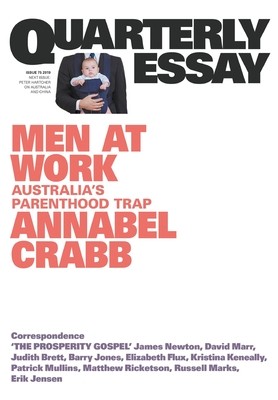
- Išsiųsime per 10–14 d.d.
- Autorius: Annabel Crabb
- Leidėjas: Quarterly Essay
- Metai: 2019
- Puslapiai: 128
- ISBN-10: 1760641529
- ISBN-13: 9781760641528
- Formatas: 17 x 24.4 x 0.6 cm, minkšti viršeliai
- Kalba: Anglų
- Extra -15 % nuolaida šiai knygai su kodu: ENG15
Atsiliepimai
Aprašymas
When New Zealand's prime minister, Jacinda Ardern, announced her pregnancy, the headlines raced around the world. But when Scott Morrison and Josh Frydenberg became the first prime minister and treasurer duo since the 1970s to take on their roles while bringing up young children, this detail passed largely without notice. Why do we still accept that fathers will be absent? Why do so few men take parental leave in this country? Why is flexible and part-time work still largely a female preserve? And what have we learned from the parental experiment of the COVID-19 lockdowns? In the past half-century, women have revolutionised the way they work and live. But men's lives on average have changed remarkably little. Is it because men don't want to change? Or is it because, every day in various ways, they are told they shouldn't? Annabel Crabb deploys political observation, workplace research and her characteristic humour and intelligence to argue that gender equity cannot be achieved until men are as free to leave the workplace (when their family lives change) as women are to enter it.EXTRA 15 % nuolaida su kodu: ENG15
Akcija baigiasi už 6d.18:43:56
Nuolaidos kodas galioja perkant nuo 10 €. Nuolaidos nesumuojamos.

- Autorius: Annabel Crabb
- Leidėjas: Quarterly Essay
- Metai: 2019
- Puslapiai: 128
- ISBN-10: 1760641529
- ISBN-13: 9781760641528
- Formatas: 17 x 24.4 x 0.6 cm, minkšti viršeliai
- Kalba: Anglų




Atsiliepimai